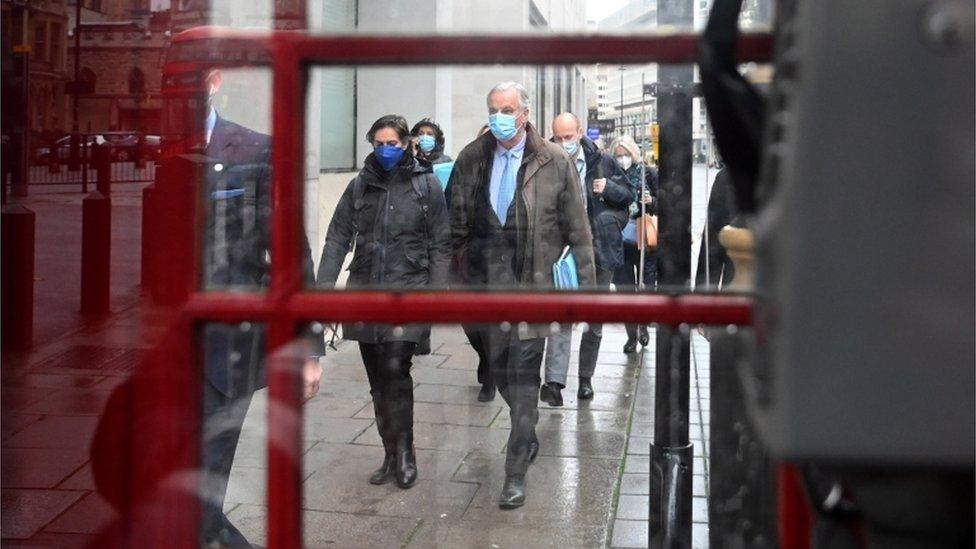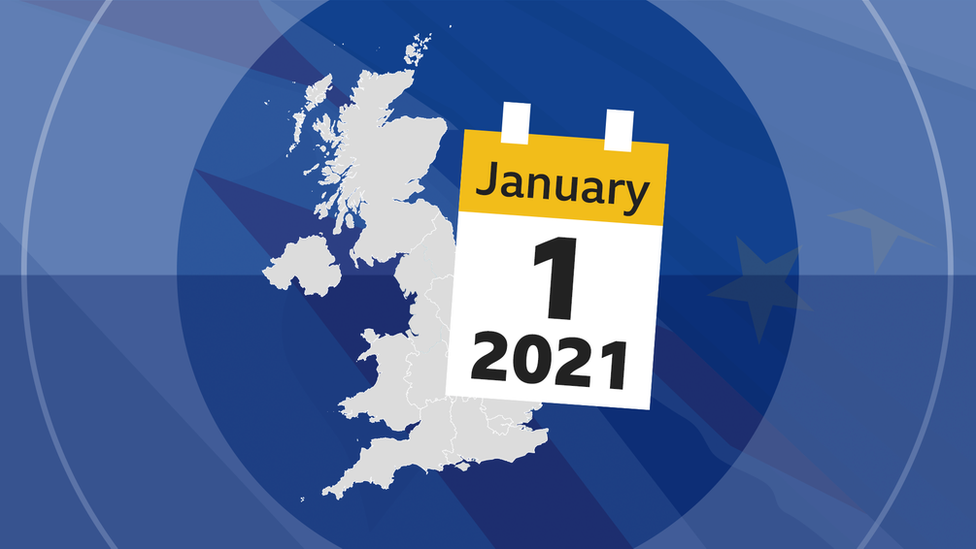Brexit talks: What comes next as negotiators hit pause button?
- Published

So, after a week of super intensive, last-ditch talks, EU and UK negotiators are going their separate ways.
The EU's chief envoy Michel Barnier heads back to Brussels on Saturday morning. His UK counterpart, David Frost, is to brief the prime minister on why the pause button was pressed.
Is this the end of the road for talks, or are we just round the corner to a Happy Ever After?
Probably neither. Just yet.
If you're in favour of this post-Brexit EU-UK trade deal and you're looking for clues to be upbeat, I'd say it's significant that the two chief negotiators issued a joint statement before parting ways.
This wasn't a case of each stomping off to a separate corner before briefing negatively about the other.
That differences remain on the three key issues: fishing rights in UK waters, competition regulations and the governance of a deal (ie how to ensure both sides stick to the agreement or face penalties) should come as no surprise.
It was ever thus.
'Getting Brexit done'
Limited progress was made this week on all fronts in talks, but as I, and many other Brexit commentators, have long suggested, you need political involvement at the highest levels to make the final, most difficult compromises.
Or to publicly declare an agreement is just not possible, and a no deal scenario is heading our way.
Positive-minded readers of this blog might also consider that, even if the EU-UK deal were almost agreed, the European Commission president and arguably, especially Boris Johnson, who has aligned himself so personally to "getting Brexit done", would want to put their personal stamp on things.
Confirmation that they will call each other on Saturday afternoon could therefore be seen as a "good" sign. Although sources in the EU and UK warn not to expect news of the conclusive Big Breakthrough following their chat.
Cynics might nod their head too when I say that - considering the uncomfortable political compromises both sides have to make to reach a deal - one more "crisis", aka the current stop in talks, is quite useful to demonstrate to the public back home that you're hanging on in there, fighting for their interests.
'France the frenemy'
That's certainly the way to interpret France's threat to use its veto if a deal is agreed, and it doesn't like it.
Emmanuel Macron has enjoyed the role of Brexit bad cop throughout. It plays well domestically.
And "France the frenemy" is an easy headline in the UK too.
But reality is more nuanced. Paris trumpets more brashly what is the belief in all EU capitals, and in the UK government: Yes to this deal but not at any cost.
The priority in Brussels is to protect the single market. The EU hoped to contain UK competition with a common rulebook.
But the UK wants to be nimble and competitive; to compromise post-Brexit sovereignty as little as possible.
Otherwise, government figures ask, what was the point of leaving the European Union?
Pressure is on
If you're looking for some certainty in all this, here you go: Neither side will sign on the dotted line if they can't sell this deal as a victory.
Negotiations will likely become even thornier if they re-start next week.
The government's Internal Market Bill was expected to return to the House of Commons on Monday.
And the long-awaited Finance Bill, scheduled to be tabled on Tuesday. Both could contain clauses contradicting the Protocol on Northern Ireland, signed with the EU last year as part of the Brexit Withdrawal Agreement.
The government insists the clauses are necessary, as a safety net, to ensure the smooth circulation of goods within the United Kingdom, in case of a no deal situation with the EU.
But the European Parliament has warned it will veto any deal with the UK, if Downing Street includes the clauses. Breaking the treaty is unacceptable, says the EU. Safety net or not.
So the pressure is on. On all sides.
We're witnessing that last minute, five to midnight scramble for a deal, widely predicted, but which the UK and EU always said was the last thing they wanted.
Related topics
- Published28 January 2021

